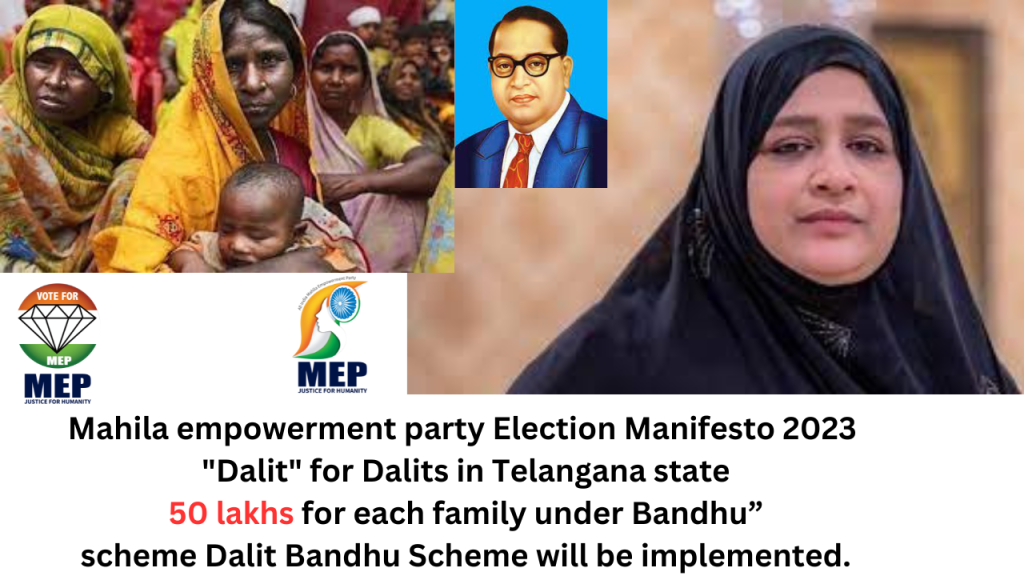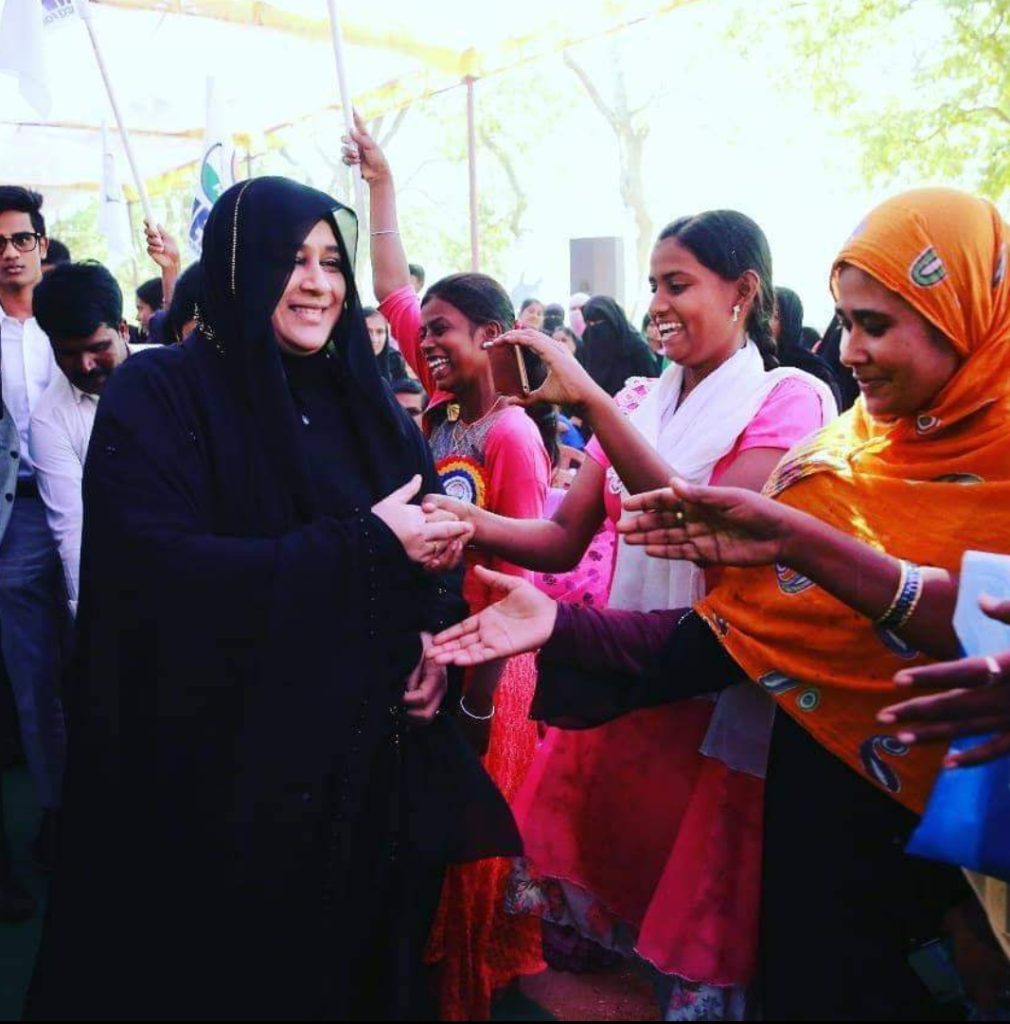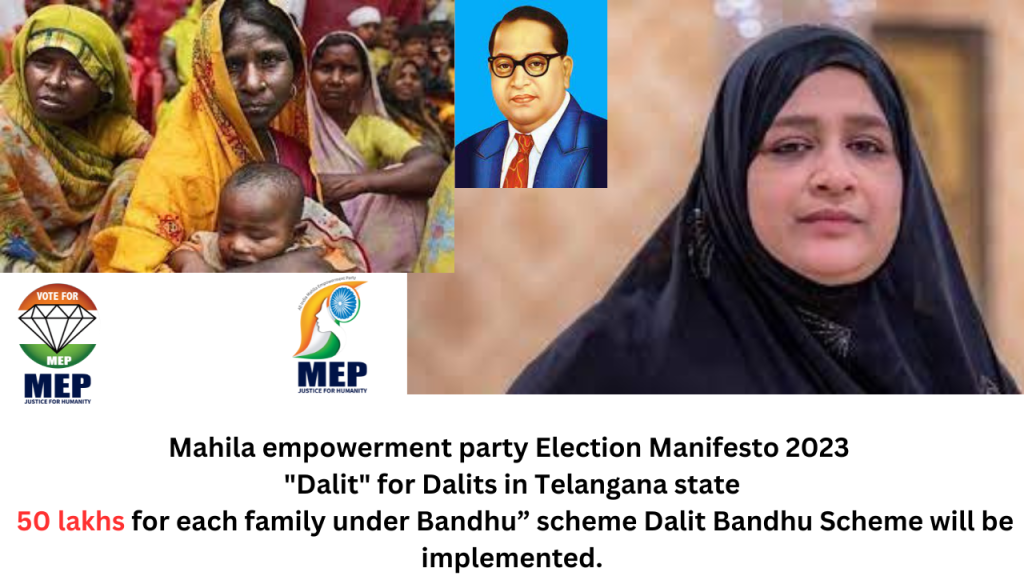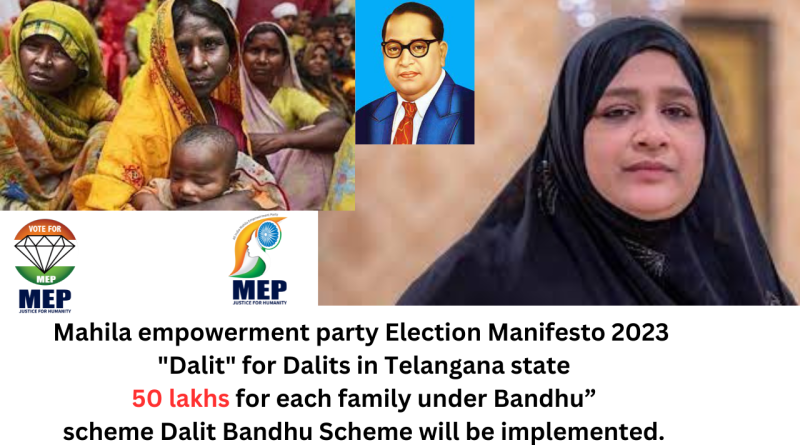Revolutionizing Women’s Empowerment: The Mahila Empowerment Party’s Unprecedented Move – The ’50 Lakhs per Family Under Dalith Bandhu’ Scheme

The Mahila Empowerment Party is a progressive political organization dedicated to promoting gender equality and empowering women in society. With a mission to address the entrenched social and economic disparities faced by women, the party has introduced a groundbreaking scheme called ’50 Lakhs per Family Under Dalith Bandhu.’ This article explores the scheme’s background, objectives, and its impact in transforming the lives of marginalized women.
II. Understanding Mahila Empowerment Party’s ’50 Lakhs per Family Under Dalith Bandhu’ Scheme
A. Background of the scheme
The ’50 Lakhs per Family Under Dalith Bandhu’ Scheme has its roots in the party’s commitment to uplifting women from marginalized communities, particularly the Dalith community. Historically subjected to discrimination and social exclusion, Dalith women face numerous challenges that hinder their socio-economic progress.
B. How the scheme aims to empower women
The primary objective of the ’50 Lakhs per Family Under Dalith Bandhu’ Scheme is to provide comprehensive support to Dalith women, enabling them to overcome barriers and achieve empowerment. The scheme seeks to address financial, educational, and socio-cultural inequalities by offering a range of initiatives tailored to their specific needs.
III. The Need for Empowering Women in Society

A. Gender inequality and its consequences
Gender inequality is a pervasive issue that limits the socioeconomic development of women. The marginalization of women not only hampers their individual progress but also has far-reaching consequences for families, communities, and the entire society. By empowering women, societies can unlock their immense potential, fostering economic growth, social harmony, and sustainable development.
B. Addressing social and economic disparities
Empowering women from marginalized communities is crucial in breaking the cycle of poverty and social exclusion. The lack of access to quality education, economic opportunities, and basic services perpetuates the existing disparities. It is imperative to implement targeted initiatives to address these disparities and create an inclusive society that values the contributions of all individuals.
IV. The Dalith Bandhu Scheme: Overview and Key Features

A. Detailed explanation of the scheme’s components
The ’50 Lakhs per Family Under Dalith Bandhu’ Scheme encompasses various components designed to address the multifaceted challenges faced by Dalith women. These include financial support for women-owned businesses, skill development and vocational training programs, and educational scholarships.
B. Eligibility criteria for availing the benefits
To avail the benefits of the scheme, Dalith women must meet certain eligibility criteria. These criteria are carefully designed to ensure that the scheme reaches those who face the greatest barriers. Eligibility factors include income level, caste, and residency within specified marginalized areas.
V. Empowerment Initiatives under the Dalith Bandhu Scheme
A. Financial support for women-owned businesses
One of the key initiatives under the Dalith Bandhu Scheme is providing financial support to women entrepreneurs from marginalized communities. This support aims to encourage entrepreneurship and create sustainable income-generating opportunities for Dalith women. Financial assistance can be utilized for business setup, expansion, and capacity building.
B. Skill development and vocational training programs
Recognizing the importance of skill development in enhancing employability, the scheme offers vocational training programs tailored to the needs of Dalith women. These programs aim to equip women with crucial skills in various sectors, such as agriculture, crafts, and technology, enabling them to secure better job prospects and economic independence.
C. Educational scholarships for women from marginalized communities
Education plays a transformative role in empowering women and breaking the cycle of intergenerational poverty. The Dalith Bandhu Scheme provides educational scholarships to support Dalith women in pursuing higher education. By removing financial barriers, the scheme ensures that women have equal opportunities to access quality education and realize their full potential.
VI. Breaking Barriers: Dalith Bandhu’s Socio-Cultural Initiatives
A. Combating stereotypes and societal prejudices
Socio-cultural norms and prejudices often perpetuate gender inequalities and hinder women’s progress. The Dalith Bandhu Scheme recognizes the significance of challenging these stereotypes and promoting gender equality. Through awareness campaigns, community engagement, and advocacy initiatives, the scheme aims to change deeply entrenched attitudes and create a more inclusive society.
B. Promoting gender equality in households and communities
To achieve sustainable and lasting change, it is essential to engage entire communities in the process of women’s empowerment. The Dalith Bandhu Scheme promotes gender equality by fostering dialogue, organizing sensitization programs, and encouraging men to become agents of change. By challenging traditional gender roles and fostering supportive environments, the scheme aims to create a society where women can thrive.
VII. Success Stories: Impact of the Dalith Bandhu Scheme

A. Personal narratives of women who have benefited from the scheme
The effectiveness of the Dalith Bandhu Scheme can be measured through the compelling personal narratives of the women it has empowered. Countless stories of previously marginalized women breaking free from the chains of discrimination and achieving remarkable success serve as a testament to the scheme’s impact. These narratives offer hope, inspiration, and tangible evidence of the transformation that is possible when women are truly empowered.
B. Positive changes witnessed in marginalized communities
The Dalith Bandhu Scheme has not only uplifted individual women but has also brought about positive changes at the community level. Through increased economic opportunities, improved access to education, and an evolving social outlook, marginalized communities have experienced a significant shift towards inclusivity and progress. The scheme has not only improved livelihoods but has also fostered social cohesion and harmony.
VIII. Collaborative Efforts: Partnerships and Support for the Scheme
A. Involvement of government agencies and NGOs
To ensure the effective implementation and sustainability of the Dalith Bandhu Scheme, collaborative efforts are vital. Government agencies and NGOs play a crucial role in supporting the scheme through their specialized expertise, resources, and outreach networks. These partnerships strengthen the impact of the scheme and enhance its reach to the targeted beneficiaries.
B. Role of corporations in empowering women through the scheme
Corporations also have a significant role to play in empowering women through the Dalith Bandhu Scheme. By supporting women-owned businesses, providing employment opportunities, and fostering a gender-inclusive work environment, corporations contribute to the economic empowerment of women. Their engagement demonstrates a commitment to social responsibility and helps build a more equitable society.
IX. Challenges Faced and Overcoming Obstacles
A. Initial hurdles in the implementation
The implementation of any transformative scheme faces challenges, and the Dalith Bandhu Scheme is no exception. Initial hurdles such as administrative complexities, resistance to change, and lack of awareness may have posed obstacles. However, the commitment of the Mahila Empowerment Party and the ongoing support of stakeholders have enabled the scheme to overcome these challenges and continue its mission.
B. Strategies employed to overcome challenges
To address the challenges faced, the Mahila Empowerment Party adopted various strategies. These include conducting targeted awareness campaigns, ensuring effective coordination among stakeholders, and developing robust monitoring and evaluation mechanisms. By continuously adapting and refining the implementation strategies, the scheme has been able to navigate obstacles and make a significant impact.
X. Evaluating the Future of the Dalith Bandhu Scheme
A. Long-term goals and projected outcomes
The Dalith Bandhu Scheme has set ambitious long-term goals to further advance women’s empowerment and eliminate gender disparities. These goals encompass increased economic empowerment, enhanced access to quality education, and the eradication of deep-rooted socio-cultural barriers. The projected outcomes include sustainable socioeconomic development, reduced gender disparities, and a more inclusive and prosperous society.
B. Sustainability and expansion plans
Ensuring the sustainability and expansion of the Dalith Bandhu Scheme is crucial to its long-term success. The Mahila Empowerment Party is committed to exploring innovative funding models, strengthening partnerships, and continuously assessing the scheme’s impact. By integrating the scheme into broader policy frameworks and scaling its initiatives, the party aims to create a lasting legacy of empowerment for generations to come.
XI. Public Reception and Criticisms of the Scheme
A. Opinions from various sections of society
The Dalith Bandhu Scheme has garnered attention from different sections of society, eliciting varied opinions. While some commend its transformative impact and applaud the commitment towards women’s empowerment, others express concerns about sustainability, resource allocation, and the potential unintended consequences. Diverse perspectives highlight the importance of an ongoing dialogue on women’s empowerment and the need to address valid concerns.
B. Addressing valid concerns and dispelling misconceptions
Addressing valid concerns and dispelling misconceptions is vital to maintain transparency and ensure the continued success of the Dalith Bandhu Scheme. The Mahila Empowerment Party actively engages with stakeholders, listens to feedback, and fine-tunes the scheme based on valuable insights. By openly addressing concerns and providing accurate information, the party reinforces trust and strengthens the foundations of the scheme.
XII. Comparative Analysis: Similar International Empowerment Programs
A. Examining successful women empowerment schemes worldwide
While the Dalith Bandhu Scheme is unique in its approach, examining successful women empowerment schemes from around the world offers valuable insights and best practices. Programs such as the Women’s Empowerment and Gender Equality Initiative in Sweden, the Akshara Women’s Empowerment Program in India, and the Microcredit and Women’s Empowerment Program in Bangladesh have all made significant contributions to women’s empowerment, providing valuable lessons for the Dalith Bandhu Scheme.
B. Lessons that can be learned and implemented
From these international examples, key lessons emerge. These include the importance of tailored interventions, engaging with local communities, promoting access to resources, and addressing systemic issues such as gender-based violence. By drawing inspiration from successful schemes and adopting proven strategies, the Dalith Bandhu Scheme can further enhance its impact and continue to revolutionize women’s empowerment.
XIII. Transformation Beyond Financial Support: Empowering Women Holistically
A. Encouraging political representation and leadership roles
Empowering women goes beyond providing financial support; it also requires creating an enabling environment for them to actively participate in politics and leadership roles. The Dalith Bandhu Scheme recognizes the need to encourage political representation and offers capacity-building programs focused on grooming and supporting women in political and decision-making positions.
B. Promoting women’s health and reproductive rights
Women’s holistic empowerment encompasses their health and reproductive rights. The Dalith Bandhu Scheme aims to promote women’s health by providing access to quality healthcare facilities, raising awareness about reproductive health, and ensuring the availability of family planning services. Empowering women to make choices regarding their health and reproductive well-being is fundamental to achieving gender equality.
XIV. Conclusion

The Mahila Empowerment Party’s ’50 Lakhs per Family Under Dalith Bandhu’ Scheme represents a ground-breaking initiative that has revolutionized women’s empowerment in India. Through its multi-faceted approach, the scheme addresses the deep-rooted social and economic disparities faced by Dalith women. By providing comprehensive support, fostering socio-cultural change, and creating opportunities for economic and political participation, the scheme has transformed the lives of thousands, ushering in a new era of gender equality and inclusivity.
XV. FAQ
A. What is the eligibility criteria for availing benefits under the Dalith Bandhu Scheme?
To avail benefits under the Dalith Bandhu Scheme, Dalith women must fulfill specific eligibility criteria, including income level, caste, and residency within specified marginalized areas. These criteria ensure that the scheme reaches those facing the greatest barriers and provides support to those who need it the most.
B. How has the scheme positively impacted marginalized communities?
The Dalith Bandhu Scheme has had a significant positive impact on marginalized communities. It has created economic opportunities through financial support for women-owned businesses, enhanced employability through skill development programs, and improved access to education through scholarships. These initiatives have not only uplifted individual women but have also brought about positive changes at the community level, fostering social cohesion and sustainable development.
C. Are there any plans to scale up the scheme in the future?
The Mahila Empowerment Party is committed to the sustainability and expansion of the Dalith Bandhu Scheme. The party aims to explore innovative funding models, strengthen partnerships with government agencies and NGOs, and integrate the scheme into broader policy frameworks. Scaling up the scheme’s initiatives will ensure a wider impact and continue to empower more women from marginalized communities.
D. What role do corporations play in supporting the Dalith Bandhu Scheme?
Corporations have a significant role to play in empowering women through the Dalith Bandhu Scheme. Their involvement includes supporting women-owned businesses, providing employment opportunities, fostering a gender-inclusive work environment, and investing in women’s economic empowerment. By collaborating with corporations, the scheme can tap into additional resources, expertise, and networks, further strengthening its impact.
E. How does the scheme address socio-cultural barriers women face in marginalized communities?
The Dalith Bandhu Scheme recognizes the importance of addressing socio-cultural barriers that hinder women’s empowerment. Through awareness campaigns, community engagement, and advocacy initiatives, the scheme challenges stereotypes, combats prejudices, and promotes gender equality in households and communities. By creating an enabling environment that supports women’s rights and opportunities, the scheme aims to break down these barriers and foster social change.



